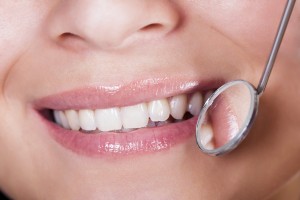 Gingivitis is one of those things none of us want to hear we have. Hearing you have gingivitis can be embarrassing, since it probably means you haven’t been keeping up with your home oral care. Gingivitis is not the same thing as periodontitis, although sometimes a person may be affected by both. Gum disease is mostly caused by improper oral hygiene that allows bacteria in plaque and calculus to remain on the teeth and infect the gums. Gingivitis is inflammation of the tissues surrounding and supporting the teeth and is most commonly a result of poor dental hygiene. Gingivitis is a very common condition and varies widely in severity. It is characterized by red, swollen gums that bleed easily when teeth are brushed or flossed.
Gingivitis is one of those things none of us want to hear we have. Hearing you have gingivitis can be embarrassing, since it probably means you haven’t been keeping up with your home oral care. Gingivitis is not the same thing as periodontitis, although sometimes a person may be affected by both. Gum disease is mostly caused by improper oral hygiene that allows bacteria in plaque and calculus to remain on the teeth and infect the gums. Gingivitis is inflammation of the tissues surrounding and supporting the teeth and is most commonly a result of poor dental hygiene. Gingivitis is a very common condition and varies widely in severity. It is characterized by red, swollen gums that bleed easily when teeth are brushed or flossed.
But there are other factors that increase the risk of developing gingivitis. Some of the most common risk factors are as follows:
- Smoking or chewing tobacco prevents the gum tissue from being able to heal.
- Crooked, rotated, or overlapping teeth create more areas for plaque and calculus to accumulate and are harder to keep clean.
- Hormonal changes in puberty, pregnancy, and menopause typically correlate with a rise in gingivitis. The increase in hormones causes the blood vessels in the gums to be more susceptible to bacterial and chemical attack.
- Cancer and cancer treatment can make a person more susceptible to infection and increase the risk of gum disease.
- Stress impairs the body’s immune response to bacterial invasion.
- Mouth breathing can be harsh on the gums when they aren’t protected by the lips, causing chronic irritation and inflammation.
- Poor nutrition, such as a diet high in sugar and carbohydrates and low in water intake, will increase the formation of plaque. Also, a deficiency of important nutrients such as vitamin C will impair healing.
- Diabetes mellitus impairs circulation and the gums ability to heal.
- Medications such as anti-seizure medications promote gum disease(Source: medicinenet.com)
The longer that plaque and tartar remain on your teeth, the more they irritate the gingiva. If harmful bacteria is not removed from teeth, they will begin to irritate the gums and cause gingivitis. If left untreated, gingivitis will often extend from the gums to the bone and lead to periodontitis. When the underlying bone gets infected, it will start to recede away from the teeth and form deep gum pockets. These pockets collect plaque and bacteria as they are very difficult to keep clean, and more bone loss occurs. As periodontal disease progresses into later stages and more bone tissue is lost, the teeth may eventually become loose and fall out.
Gingivitis can be prevented by proper and consistent oral hygiene. Make certain to eat a balanced diet and visit the dentist regularly. Brush your teeth twice daily with fluoride toothpaste. As always, floss your teeth every day!
For more information on oral health and to make an appointment call, Dr. Kirtley at 317-841-1111 or visit his website dentalimplantsi
Dr. Kirtley gladly welcomes patients from Spring Hill, Beech Grove and Warren Park.
